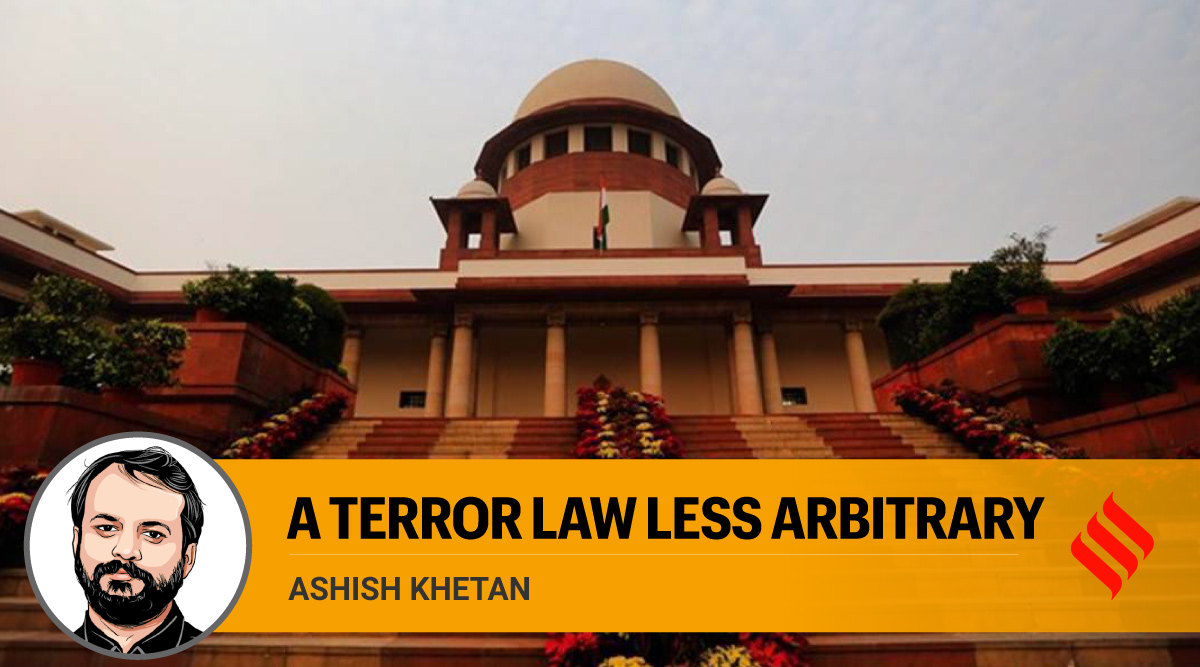


In a significant ruling, the Supreme Court extended the Pankaj Bansal judgment to apply to cases under the Unlawful Activities (Prevention) Act. This means that any person arrested under UAPA or any other offence has a statutory right to be informed about the grounds of arrest in writing. The Court emphasized that this right is essential for the arrested person to consult their legal counsel and seek appropriate legal remedies. This ruling reaffirms the sanctity of the fundamental right to be informed of the grounds of arrest, as guaranteed by the Constitution of India.
Landmark SC Ruling: Expanding the Right to Know Arrest Grounds under UAPA
In a significant judgment, the Supreme Court has extended the Pankaj Bansal judgment to apply to cases under the Unlawful Activities (Prevention) Act (UAPA). This ruling strengthens the fundamental right of arrested individuals to be informed about the reasons for their detention.
Background
The UAPA, enacted in 1967, is a stringent anti-terrorism law that authorizes the authorities to arrest and detain individuals suspected of involvement in terrorist activities. However, concerns have been raised about the abuse of this law and the lack of due process protections for those arrested.
The Pankaj Bansal judgment, delivered in 2018, held that it is a fundamental right of every arrested person under Article 22(1) of the Indian Constitution to be promptly informed about the grounds of their arrest. This right includes providing a copy of the arrest memo or other documents that contain the reasons for the detention.
Supreme Court Ruling
The recent Supreme Court ruling extends the Pankaj Bansal judgment to cases under UAPA. This means that any person arrested under UAPA now has a statutory right to be informed about the grounds of their arrest in writing.
The Court emphasized that this right is essential for the arrested person to consult their legal counsel and seek appropriate legal remedies. It also noted that the lack of clarity about the reasons for arrest can lead to prolonged detention and psychological harm to the accused.
Top 5 FAQs and Answers
1. What is the significance of the Supreme Court ruling?
It strengthens the fundamental right of arrested individuals under UAPA to be informed about the grounds of their arrest, ensuring due process and legal recourse.
2. How does the ruling impact arrests under UAPA?
It mandates the authorities to provide a written statement of the grounds of arrest to the accused, facilitating legal representation and access to remedies.
3. What is the legal basis for this right?
The right to be informed of the grounds of arrest is enshrined in Article 22(1) of the Indian Constitution, which guarantees the protection of personal liberty.
4. What happens if the authorities fail to provide the grounds of arrest?
The accused may file a writ petition in the High Court or Supreme Court challenging the legality of their detention.
5. What are the potential implications of the ruling?
It could lead to a decrease in arbitrary arrests and detentions under UAPA, as well as improved legal protection for accused individuals.
Conclusion
The Supreme Court ruling on UAPA is a major step forward in protecting the fundamental rights of arrested individuals. By extending the Pankaj Bansal judgment, the Court has ensured that anyone arrested under UAPA has a statutory right to know why they are being detained. This ruling will have significant implications for future cases and will help prevent the misuse of the Act.

The Kasibugga Venkateswara Temple in Srikakulam district was the site of a heart-wrenching stampede, causing multiple fatalities and affecting the community deeply. Chief Minister N. Chandrababu Naidu has expressed his sorrow over the unfortunate incident, as well as directing officials to ensure that those injured receive the best medical treatment possible. As local officials and public representatives are called to oversee relief operations, swift action is required to aid those affected and manage the situation effectively.

Indian Prime Minister Narendra Modi inaugurated the Shanti Shikhar Academy for Peaceful World in Raipur, praising the Brahma Kumaris organization for bridging India's ancient wisdom with the world's search for harmony. He credited the group's selfless service and spiritual discipline for their efforts towards universal peace. He positioned the Brahma Kumaris as protectors of India's soul and highlighted India's proactive role in addressing global crises such as disaster relief and environmental threats.

In an act of solidarity and protest, millions of Muslims in India used their Friday prayers to denounce the recent killings that took place in Pahalgam. The news comes amid growing tensions between the Muslim community and the Indian government. Many are viewing this as a sign of unity and determination from the Muslim population in India.

The state of Karnataka, or Kannada Rajyotsava, marked its 69th anniversary with a grand ceremony organized by the district administration in Mangaluru. District in-charge minister Dinesh Gundu Rao paid tribute to the leaders and writers who fought for a unified Kannada state and presented awards to 80 outstanding individuals and organizations. In his address, the minister highlighted the rich cultural and historical heritage of Karnataka and called for a sense of pride among its citizens.

Telangana's 'Run for Unity' event marked the 150th birth anniversary of Sardar Vallabhbhai Patel, India's first Deputy Prime Minister and architect of national integration. The event, carrying the message of "Ek Bharat - Shreshth Bharat", honored Patel's legacy of unity, sacrifice, and nation-building. Telangana BJP President N Ramachander Rao paid tribute to Patel and highlighted his pivotal role in integrating princely states, including Hyderabad, into the Indian Union. He also commended Prime Minister Narendra Modi and Home Minister Amit Shah for upholding Patel's ideals of national integrity.

The FBI has successfully stopped a potential terrorist attack in Michigan on Halloween weekend, according to FBI Director Kash Patel. Multiple suspects have been arrested after allegedly planning a violent attack that was connected to international terrorism. The suspects, whose ages range from 16 to 20, had engaged in firearms training and mentioned "pumpkin day" as a code for Halloween. White House Senior Director for Counterterrorism Seb Gorka confirmed the thwarted attack and stated that it was intended to occur during a time when children should be enjoying themselves.

Amidst criticism over his comments on his interfaith marriage to his Hindu wife, Usha, US Vice President JD Vance reiterates the importance of mutual respect, trust, and communication in their union. While he hopes she may someday embrace his Christian faith, her decision to maintain her beliefs is respected. Despite their differences, the couple has agreed to raise their children in the Christian faith, with Usha supporting them. At a Turning Point USA event, Vance also reaffirmed the couple's balanced approach towards managing their interfaith household.

Three days after TVK leader Vijay met with the family members of the victims of the Karur tragedy, Central Bureau of Investigation (CBI) team led by Superintendent of Police Praveen Kumar visited the rally site in Velusamypuram where the deadly stampede occurred. The officers conducted inquiries with locals and studied the topography of the area, as well as Vijay's travel route. The transfer of the case to the CBI and the re-registration of the FIR remains a secret and its contents have not been made public yet.

Prime Minister Narendra Modi praised the demonstrations by the indigenous dog squad as one of the most admired parts of the Rashtriya Ekta Diwas parade at the Statue of Unity. The squad included breeds like Rampur Hounds and Mudhol Hounds, with Mudhol Hound "Riya" leading the pack. PM Modi also applauded the Assam Police's Motorcycle Daredevil Show and the cultural performances at the parade, which reflected the theme of "Unity in Diversity." The event was attended by five Shaurya Chakra awardees and 16 gallantry medal winners from the CRPF and BSF.

The FBI has announced the arrest of multiple individuals in Michigan who were planning a violent attack over the Halloween weekend. Director Kash Patel praised the vigilance of law enforcement personnel and assured the public that there was no threat to the community. These arrests come after a previous arrest in May of a Michigan man who allegedly planned an attack on a US Army facility on behalf of the Islamic State group. The suspect remains in federal custody and is expected to plead guilty.